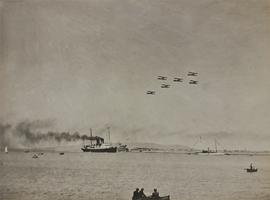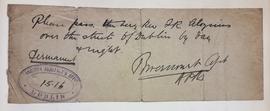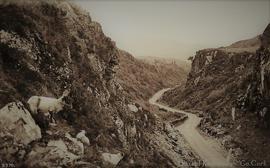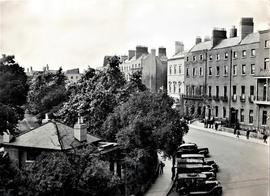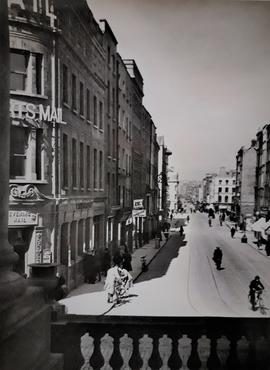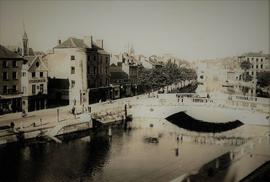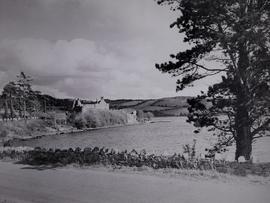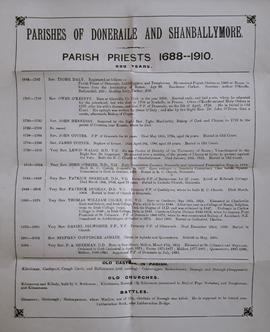The subseries comprises a small collection of papers relating to the Irish writer and translator Tadhg Ó Murchadha, who was known by the pseudonym ‘Seandún’.
Ó Murchadha was born in Macroom in County Cork in September 1843. He was baptized on 4 September 1843. His native language was Irish. Before the famine, most of the population of Macroom were Irish speakers. He trained as a tailor and moved to Cork in 1864 where he spent the rest of his life. He learned to read and write Irish and encountered many of those involved in the Irish revival movement. In 1885 he met Donnchadh Pléimionn (1867-1900), a noted Gaelic author and journalist, and it seems that Ó Murchadha’s interest in language matters began in earnest around this time. He was a founder member of the Cork branch of Gaelic League in 1894. Ó Murchadha had a fine appreciation of the flexibility of the Irish language and in his writing, he sought after accuracy and polish and achieved a style that was natural and free from self-consciousness. He emerged as a pioneer in Irish translation at the beginning of the Gaelic revival. His earliest attempt at writing was a translation of Robert Emmet’s ‘Speech from the dock’, and he went on to translate, under the title ‘Toradh na Gaedhilge ar aitheasc agus ar ghréithribh na nGaedhael’ (1905), William O’Brien’s ‘The influence of the Irish language on Irish national literature and character’. Ó Murchadha remains best known for his translations although he did contribute articles to the ‘Cork Weekly Examiner’ and the ‘Gaelic Journal’. He wrote an account of the life of Donnchadh Pléimionn which appeared in the ‘Weekly Examiner’ on 13 September 1900.
He compiled an Irish translation of Daniel Dafoe’s ‘Robinson Crusoe’ under the title ‘Eachtra Robinson Crúsó’ which was published by the Gaelic League in 1909. Tadhg Ó Donnchadha (‘Torna’) (1874-1949), later Professor of Irish in University College Cork, remarked that Ó Murchadha’s ‘Robinson Crusoe’ was the best translation he had ever read. About 1912, when his sight was beginning to fail, Ó Murchadha began to dictate an autobiographical account of his life, which was transcribed by friends and admirers among them Diarmuid Ó Murchadha and Toirdhealbhach Mac Suibhne (Terence MacSwiney), who during the War of Independence prepared a section of it dealing with the years of the Fenian rising for publication in book form under the title ‘Sgéal “Sheandúin”’ (1920). However, Ó Murchadha never saw it in print as he died in Cork on 13 April 1919. The second part of Ó Murchadha’s recollections was edited and published by Br. Senan Moynihan OFM Cap. in the Irish Capuchin periodical ‘The Father Mathew Record’ (July 1924-August 1925). The articles again appeared under the title ‘Sgéal “Sheandúin”’.
Much of the material listed here is associated with Moynihan’s publication of the second part of Ó Murchadha’s memoir. The file includes original material from several associates and admirers of Ó Murchadha including Tadhg Ó Donnchadha (‘Torna’), Terence MacSwiney, and Douglas Hyde. The collection also includes correspondence from Fr. Laurence Dowling OFM Cap. (the editor of ‘The Father Mathew Record’), Máire Nic Shuibhne (Mary MacSwiney), Diarmuid Ó Murchadha, Fr. Augustine Hayden OFM Cap., and Shan Ó Cuiv. Some letters from Frank Ryan, the well-known Irish socialist and republican activist, are also extant in the collection. Ryan seemingly assisted Moynihan in preparing Ó Murchadha’s memoir for publication. The collection also includes Moynihan’s manuscript drafts of ‘Sgéal “Sheandúin”’ along with a copy of Ó Murchadha translation of Robert Emmet’s ‘Speech from the dock’ written by Terence MacSwiney.

